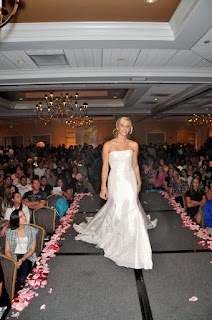



The Dress of Your Dreams
It's the day you've been dreaming about since you were a little girl, perhaps you even consider it the most important of your life. Yor wedding day. Family, flowers, food, all of these are wonderful parts of your wedding day. But the most exciting part for any girl (besides marrying your Prince Charming) is picking out the wedding dress of your dreams. But there is so much to consider, and sometimes it seems you'll go completely bonkers before you can ever decide on just one dress! Take a deep breath, drink some tea, and let me guide you through some tips that will hopefully lead you to the perfect wedding dress.
It's the day you've been dreaming about since you were a little girl, perhaps you even consider it the most important of your life. Yor wedding day. Family, flowers, food, all of these are wonderful parts of your wedding day. But the most exciting part for any girl (besides marrying your Prince Charming) is picking out the wedding dress of your dreams. But there is so much to consider, and sometimes it seems you'll go completely bonkers before you can ever decide on just one dress! Take a deep breath, drink some tea, and let me guide you through some tips that will hopefully lead you to the perfect wedding dress.
Match the Dress to the Occasion
Now this might sound silly, I mean it's a wedding, right? Well, yes and no. Each wedding sets its own tone and has its own theme. Perhaps you are having sunset wedding right on the surf. Or maybe you are having a good old fashion country hoe-down with ribs and beer. Or perhaps you are having a classic cathedral and sit down dinner wedding. Whichever occasion suits your mood you are going to want a dress that matches both in form and function.
Now this might sound silly, I mean it's a wedding, right? Well, yes and no. Each wedding sets its own tone and has its own theme. Perhaps you are having sunset wedding right on the surf. Or maybe you are having a good old fashion country hoe-down with ribs and beer. Or perhaps you are having a classic cathedral and sit down dinner wedding. Whichever occasion suits your mood you are going to want a dress that matches both in form and function.
If you are having a beach wedding a slip dress with a knee length hem is simply perfect. For a country wedding the overiding factor is function. Does the dress keep you cool enough? Does it drag on the ground (possibly getting dirty)? How will it look with BBQ sauce on it? These questions are quite legitimate; I know one bride whose tulle dress hem will always be brown, even after cleaning. For a classic church wedding the full skirted dress is a classic. Feel free to play things up a little though, and stick to the features you like most in a dress.
Shop Around
Do yourself a favor and don't buy a dress the first time you go out. Try on several dresses, and then sleep on it. Go back, with another woman (I took my mother), and try on that special one to see if you still feel the same. Most employees at bridal shops work on commission, so they can border on car salesman-ish at times. Visit more than one shop and try on dresses wherever you go. This is a special dress that you will only wear one time, so it's a very big decision that you cannot let anyone pressure you into.
Aim High
Don't be afraid to aim high--no matter what your budget. Some brides knew from the start they wanted a designer label, but life just didn't cooperate by making them heiresses. Yet all is not lost if you're willing to shop courageously. At any given moment, a better-heeled bride is selling her once-used St. Pucchi or Ulla-Maija on eBay. She paid thousands upon thousands, but you, smart shopper, will pay half that or less. To take this road, you must shop earlier than other brides so you'll have a choice of gowns. Always pay with a credit card so you'll have recourse if the dress doesn't arrive in acceptable condition, and again, shop early so you can buy another if necessary. Shop courageously, but not recklessly.
Shop Online
Shop online, but never send a check. Bridal gown businesses sometimes have a way of disappearing overnight. No matter what the proprietor tells you, never make a purchase as large as a wedding gown without the chargeback protection of a credit card. If they say they can't take plastic, move on.
Don't Buy Too Early
Don't buy too early unless you must. Bridal gowns can take four to ten months to come from the manufacturer, but there's no reason to buy over a year ahead of time, unless your chosen style is going to be discontinued. Give yourself some time to sit on your decision. Once you pick a gown, you'll see a hundred others nearly like it. You'll become a walking encyclopedia on that style of gown. All the better if you still have room to choose.
Don't Hold Out Forever
Don't hold out forever for the dress. Some brides never find the dress. What they do find is a few dresses they look beautiful in. If you're this bride, try starting your planning from the theme instead of the dress. You'll probably eventually get sick to death of dress shopping. When that happens, "good enough" really will be good enough. Concentrate on other aspects of the wedding that mean a lot to you, like the venue, the food, or the inevitable adoration of your soon-to-be husband.
P.S.
Was this article helpful? Please leave a comment.



